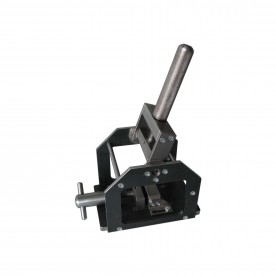- Home
- About Us
- Products
- Rohmann Eddy Current
- Secu-Chek UV-LED Lamps
- Sonatest
- MR Chemie
- NOVO DR
- Hoffmann Tam Panels
- Desoutter Industrial Tools
- Novotest
- Integrated Design Tools (IDT Vision)
- Dakota NDT
- DeFelsko Corporation
- AVIONICS
- Sonotec Ultrasonic Solutions
- Sonotec Ultrasonic Hand-Tools
- G.A.L. Gage Company
- Western Instruments Inc.
- Esders Gas Technology
- Yoancomposite
- Hinode Electric
- Services
- News
- Contact Us
 (65) 6878 0608  (65) 6878 0609 |

BENDING COATING TESTER NOVOTEST BEND-M1519
The device allows to measure the elasticity and strength of coatings through bending the metal plate with tested coating applied around a set of cylindrical rods with diameters of rods from 2 mm to 32 mm (other diameters on request). The device complies with ISO 1519-73 and applies to paints and specifies a method for determining the elasticity of the film during bending. The method consist in the determining of the minimum diameter of the cylindrical metal rod, after bending around it, the painted metal plate, does not get the mechanical destruction or delamination of single- or multi-layer paint film (ISO 1519, DIN 53 152). Flexibility is tested by rounding the tin plate with coating around the cylindrical rod with diameter from 2 to 32 mm. The flexibility value of coating with certain film thickness – is the smallest diameter of rod, when cracking does not occur.
Bending Coating Tester NOVOTEST BEND-M1519 is the instrument which consist of the frame with fixed clamps for tested samples and a special mechanism for rounding plates around the rod with different diameters. Pre-prepared tested sample is placed between the clamps and secured by rotating the handle. After that push the tested object to the top of rod by rotating the handle and bending the plate around the rod.
Advantages:
NOVOTEST BEND-M1519 compared to other bend testers for coatings, for example NOVOTEST BEND-H1519, allows to bend with a clearly predetermined gap (or without any gap) around the rod without deviation from the perpendicular and minimizes the impact of human factors on testing accuracy.
Application of the device
It is recommend to use painted tin plate.
Tin plate has to have a smooth surface without any voids, rusty spots, fibrations and impurity.
The test samples are rectangular plate with length 100 – 200 mm and width 20 – 50 mm, which are made of black polished tin metal sheet with thickness 0,25 – 0,32 mm or aluminum sheets and strips with thickness 0.25 – 0.30 mm which coated with single-layer or multi-layer paint film on them.
The method of applying the paint on the material, thickness of film, number of layers, conditions and time of drying and exposure of the film before the test, must be specified in the specifications and technical documentation of the tested material.
The samples before testing are to be withstanded at the conditions which are specified in the specifications and technical documentation of the painting material.
The time and degree of drying is determined according to ISO 1519, DIN 53 152.
The thickness value of tested paint film which applied to the plate can be measured with coating thickness gauges, for example Coating Thickness Gauge NOVOTEST TP-1.
The tin plate is to be secured in clamps on the rod with maximum diameter (20 mm), coated side to outside, and pressing it tightly to the rod, smoothly bend it within 1 – 2 s for 180 ° around the rod.
After that coating layer at the bend-place is to be analysed using magnifying glass with 4-fold zoom for cracks and delamination.
If defects are absent, user has to repeat bending of the plate, but each time at a different location, successively from larger to smaller diameter of the rod, until anу mentioned above defects are spotted.
If the specifications and technical documentation to the painting material stipulated the value of elasticity (rod diameter), the test is carried out using only a rod of this diameter.
The result should be the minimum diameter of the rod in millimeters, when the tested sample after bending haven’t any destruction on paint film.
Evaluation elasticity value of the film through the bending on a metal rod makes after three tests of plates on the same rod.
| specifications | |
| Measurement range | from 2 mm to 32 mm (others – on request) |
| The length of the test bars, no more | 80 mm |
| Diameters of cylindrical rods | 2 mm, 3 mm, 4 mm, 5 mm, 6 mm, 8 mm, 10 mm, 12 mm, 15 mm, 16 mm, 20 mm … 32 mm |
| The material of rods | steel |



